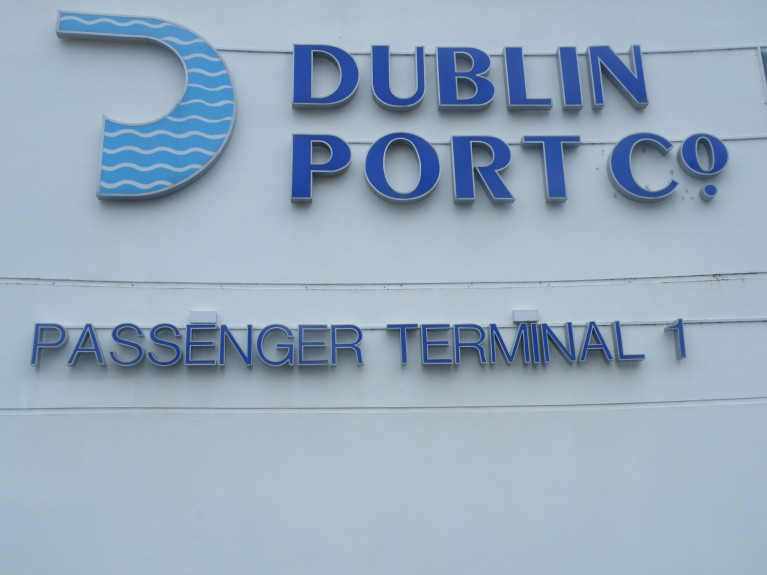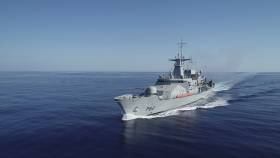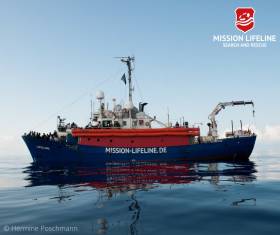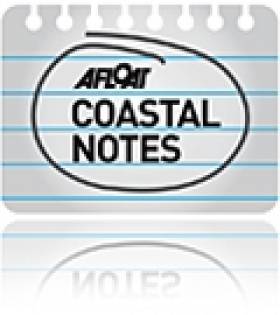Displaying items by tag: Tánaiste
The Tánaiste Micheál Martin and Minister for Defence yesterday officially announced the names of the two newest additions to the Naval Service fleet, which had been purchased from the New Zealand Government.
The Inshore Patrol Vessels (IPV) named the LÉ Aoibhinn and LÉ Gobnait, are currently undergoing a comprehensive work regime at the Naval Base in Haulbowline, Cork Harbour, from where the pair arrived almost a year ago.
Originally, the twin ‘Lake’-Class IPV’s named HMNZS Rotoiti and HMNZS Pukaki had served the Royal New Zealand Navy, but will be tested on crew familiarisation and training before deemed operational when deployed in the Irish Sea on the east and south east coasts.
The inshore cutters will play a role in the fishery protection service in line with Ireland’s obligations as a member of the EU. In addition, the pair, each with a core crew of 20, will also carry out several non-fishery-related tasks along with maritime surveillance operations.
The purchase of the IPV’s marks one of several measures introduced by the Irish Government to “increase the capabilities of the Naval Service in the Irish Exclusive Economic Zone.”.
More from the Irish Examiner on the IPV’s that will play a role in the safeguarding of the EEZ, which remains a top priority for the country.
The IPV’s Afloat add that a formal naming and commissioning ceremony will take place later in the year.
The twin patrol cutters directly replace the Coastal Patrol Vessels (CPV) LÉ Orla and LÉ Ciara, which originally served for the UK’s Royal Navy when based in Hong Kong. The pair joined the Naval Service in 1988 and were decommissioned in 2022 along with the Helicopter Patrol Vessel (HPV) flagship, LÉ Eithne, and the trio are to be disposed of through recycling.
Noting the above ‘file’ photo of the former flagship berthed in the Naval base basin, however it was towed away in March, marking the final departure of the vessel from Haulbowline.
The Tánaiste Leo Varadkar said Ireland is "not in a position" to restore the Common Travel Area (see Ferry News) just yet because the advice from the National Public Health Emergency Team is that there are "real concerns" about the prevalence of the variant that first originated in India in Britain.
He added that these restrictions could continue when travel has resumed within the EU this summer.
Speaking on RTÉ's Morning Ireland, Mr Varadkar said the lifting of restrictions will see a "phased return" to international travel but warned that it will not be like it was before the pandemic.
He said it is great there will be a return to travel abroad soon, but the Government is going to do it as safely as possible.
"There are going to be restrictions and requirements around vaccines and testing and we will be back to a situation with different rules for different countries," he said.
Mr Varadkar said the date for international travel will be confirmed later today at Cabinet with a clear roadmap and confirmed that all EU countries will come off the mandatory hotel quarantine list.
More here from RTE News.
Tánaiste Rules Out Naval Service Suspending Mediterranean Role
#NavalService - The Tánaiste Simon Coveney has ruled out suspending Ireland's Naval Service involvement in the Mediterranean migrant rescue mission and bringing crews home to deal with staff shortages.
As The Irish Times writes, Independents4Change TD Clare Daly claimed “the service is in meltdown”, said that for the first time in its history the service was unable to do its core function of sea fisheries protection.
She suggested it was time suspend the State’s participation in Operation Sophia and bring staff home to “protect our sea fisheries and coastal waters”.
She was commenting after it emerged that senior Naval personnel were ordered to end the 72 hours notice personnel normally got to provide short-term relief on ships and that personnel would have to be ready for duty without warning.
The order was subsequently rescinded.
The Dublin Fingal TD said that ships normally crewed by 44 personnel were putting to sea with 34 and she asked if it was time to bring the crew members home from Operation Sophia.
For further reading on Operation Sophia, click the link to the newspaper here.
#NewsUpdate - Tánaiste Simon Coveney hopes Ireland's decision to take 25 migrants from a stranded rescue ship will encourage other EU countries to do the same.
As The Irish Examiner reports, MV Lifeline, which is carrying 234 rescued migrants, has been stranded off the coast of Malta for several days.
The Maltese government has now agreed to allow the Lifeline to dock, after Ireland and other countries agreed to house some of the migrants.
The ship had been barred from a number of European ports over the last week.
Tánaiste Signs New Maritime Boundary Agreement
#MaritimeBorder - Tánaiste and Minister for Foreign Affairs Eamon Gilmore has signed a new agreement that establishes a fixed maritime boundary between the UK and Ireland's offshore areas, as The Irish Times reports.
Gilmore put pen to paper on the deal with British ambassador to Ireland Dominick Chilcott that finalises a single boundary between the Exclusive Economic Zones (EEZ) and continental shelves of both countries.
The agreement is expected to ease development of offshore energy projects, as well as improve fisheries protection and marine conservation in the EEZ, which lies above the continental shelf between 12 and 200 nautical miles off the coast.
However, despite the new deal, Ireland and Britain's differing claims over Rockall in the North Atlantic remain.
The small rocky islet, 228 nautical miles northwest of Donegal, is also claimed by Denmark and Iceland.
































































